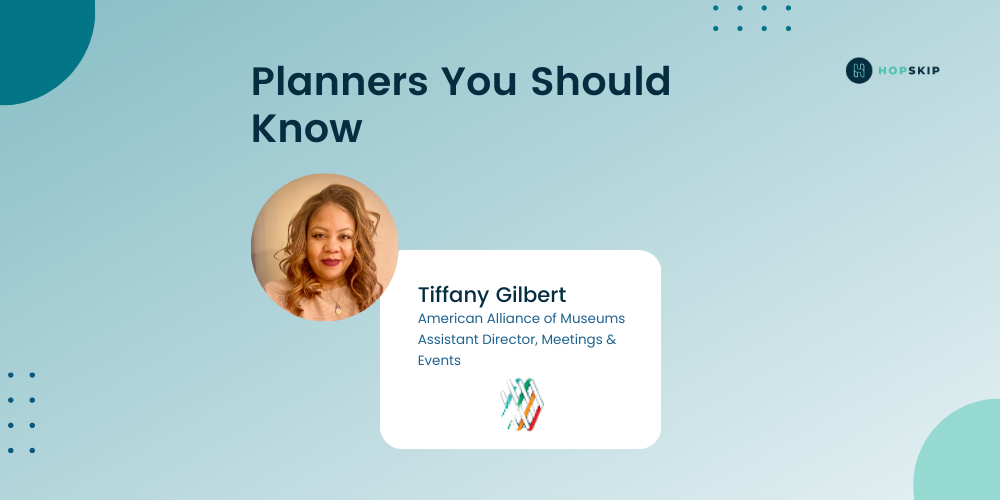Planners You Should Know - Tiffany Gilbert, American Alliance of Museums
Tiffany Gilbert, of the American Alliance of Museums, discusses how she honed her skills over the pandemic to now be in position to overcome the challenges that the new meetings/events landscape brings.
Luke Whalin
Jan 25, 2023

This post is part of the HopSkip Planner Spotlight Series where HopSkip spotlights planners across the industry to bring awareness of how they adapted to COVID-19, communicating and lessons learned and sharing how they are viewing the meetings and events industry in a post-pandemic world.
Name: Tiffany Gilbert
Company Name: American Alliance of Museums
Job Title: Assistant Director, Meetings & Events
Years of Experience: 15+
How did you get your start in the events industry? What made you pursue this role?
I was originally an administrative professional at a health-based association and was contacted by the same association's Director of Meetings to consider a meetings planner position in their department. Although it was not a role I was familiar with, I was assured that I would do well based on my performance in my other role. Later in my career, I became more involved with content, sessions, and presenter management.
How do you compare planning your first in-person event post-pandemic, to planning meetings/events pre- Covid? What was different and unique? What was similar?
What was your number one challenge in hosting your first in-person event(s) and how did you overcome it?
We didn't know what to expect post-pandemic. Issues we never considered pre-pandemic became tantamount. Masks, social distancing, not knowing what attendance would be like, and being forced to reduce session room numbers to allow for adequate spacing for attendees. Our primary concern was for attendee safety and comfort. In the end, although cautious, participants were happy to gather and connect with colleagues just as they did pre-pandemic.
Just weeks prior to our in-person event several registrants had to cancel due to Covid related exposure or illness. We did not have a virtual component. We also have a cancellation fee that was already in effect. We waived the cancellation fee for those who could prove they were affected by Covid. The biggest challenge was ensuring attendees felt safe. Luckily we had begun providing frequent status updates from the event host city and event locations in advance, and although registration numbers were lower than in previous years, we maintained the contracted space in the venue to allow for adequate social distancing.
What is the top learning that you uncovered from the last two years that you’re implementing in your planning process today? (any other tips or tricks you want to share?)
I learned about the power of reaching a different group through virtual offerings. During the pandemic, our association held two virtual annual meetings. This allowed attendees that may not be able to attend in-person events due to budgetary or timing restraints to connect with colleagues and gain helpful, professional development virtually. With that, we've begun planning an annual virtual event, as well as increasing our digital content and professional development opportunities. We have been relying heavily on evaluations and surveys to structure our digital programming and engagement.
If your bandwidth allows, research the hotels in advance of the RFP. Inquire about staffing, events, large groups, and even renovations or construction. These elements may play a part in the RFP response or the status of the hotel's ability to fully accommodate your RFP. Taking the extra step to do research, especially during this period of change within the tourism community is critical for managing expectations.
Because of the current climate and challenges with the tourism industry, we've noticed an increase in hotel room rates. Room rates can be the deciding element for an individual to attend our conference. We work with a company that manages our city-wide contracts and assist us with negotiating room block commitments. Since we secure city-wide contracts well in advance, we generally have decent rates. However, what may have been a reasonable rate pre-pandemic may be a bit higher for some attendees. In an effort to ensure attendees are securing hotels within the housing block, we attempt to partner with those hotels to offer incentives to attendees who book within our block.
Be clear about challenges the hotel is currently facing or anticipates occurring during our event. It allows planners the opportunity to make decisions or adjustments to ensure their event is as successful as it can be.
Due to the pandemic, our events community had to evolve, adapt, and grow. Many planners started to embrace new technologies as a result of the pandemic. What new tech are you using today in your planning process as a result?
It's not necessarily new, but we have decided to contract all events platforms into one platform. This includes registration, proposals, exhibits, and mobile app. This is allowing us to manage content, and logistics in one place, while also producing more detailed reports. We've also incorporated the use of an email management platform which has been incredibly helpful with managing email inquiries and requests.
Since education and relationships are two major pillars in the meetings and events industry, any suggestions on how other planners can learn and network with their peers across the industry?
In my opinion, the best way to share education and network is through the use of social media. Social media has been one of the best tools for me as a meeting planner that is somewhat introverted. I'm able to make use of resources, have information shared with me that I may not have been aware of, and make great connections without leaving the comfort of my workspace.